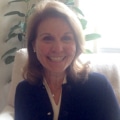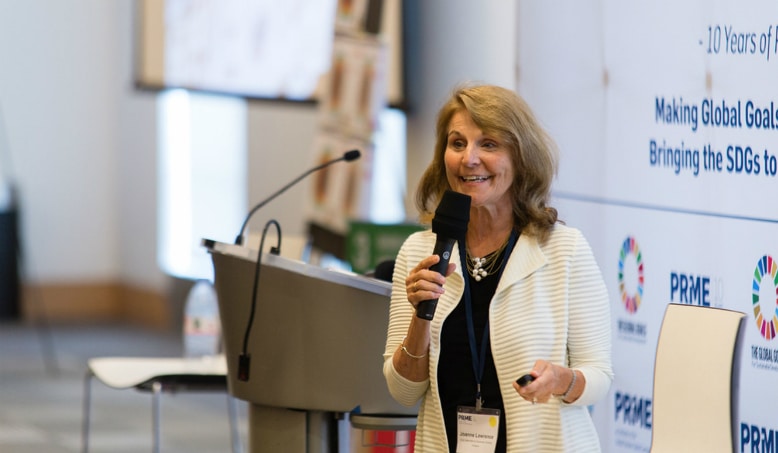Considered the “Oscars” of academic case publishing, we’re incredibly proud to announce Hult Professor Joanne Lawrence and Executive MBA graduate Kevina Kenny have been awarded the 2018 Best Case in the Case Centre’s Ethics and Social Responsibility category.
Despite being miles apart, Joanne and Kevina worked with Andreas Rasche (Professor at Copenhagen Business School) to examine Unilever’s Sustainable Living Plan and better understand how good business practices can generate sustainable revenues for organizations. We spoke with Joanne to congratulate her on the outstanding achievement and for a Q&A profile feature as one of Hult’s inspiring #FearlessFemales.
What first motivated your interests in sustainability and social impact?
Joanne: When I was younger there were two things that drove me: one, was to be a ‘world person’ and two, that the world would be a better place because of what I did. My first impulse was journalism. I could see that everything was connected to everything — and journalism had the power to educate and influence.
I then later decided to pursue a business career first. Business got things done. It had the energy, the resources and the capability to make things happen, and I wanted to make things happen! Business –from the steam engine to the automobile, from time-saving appliances to life-saving medicines., has always been about making our lives better.
Business can change lives through what they do and how they do it.
– Joanne Lawrence
Hult Professor of Practice, Business & Global Society
I remember the first company I worked for and the technology that had emerged from the space program that was now saving lives, or when I joined a pharmaceutical company, the first thing I learned was what life was like before antibiotics and how many people died from illnesses that today we would never consider life-threatening.
Aside from improving our lives through what they make, business can change lives through what they do and how they do it. I recall a pivotal moment when many multinational companies were being boycotted because they had interests in then apartheid-divided South Africa. The government found itself under increasing economic pressure as companies began to pull out of the country until eventually the apartheid regime was broken.
Or if we think about how consumers, taking an active stand, led to many multinational companies changing their labor practices in the developing world, in the end, bringing millions of people out of poverty. This is a recognition of the life-changing, transformative power of business.
As a member of the United Nations PRME, here’s a glance into how Hult is committed to fostering sustainable development goals:
Why are these themes so important, especially for business students?
Joanne: We are all interconnected today – nothing happens in a vacuum. We have seen time and again how all the issues today are global issues: what happens in one country no longer stays in that country. From financial markets to climate change to inequality—the issues cross boundaries, and so must the solutions. But aside from risks to be managed, there are also huge opportunities presented by solving some of the world’s most pressing social challenges: from access to clean water and energy, to food security to solving health issues halfway around the world, these challenges are only going to grow greater as the world hurtles towards 9 billion people by 2050.
What happens in one country no longer stays in that country. From financial markets to climate change to inequality—the issues cross boundaries, and so must the solutions.
– Joanne Lawrence
Hult Professor of Practice, Business & Global Society
So far, business has focused on the top billion, many of whom are aging. The employees and consumers of the future will be found in the developing world, where many of these challenges exist. Bringing more people into the global economic system, unleashing not only new business opportunities but also greater opportunities for societal stability. It becomes a virtuous circle: business and society, interconnected, each prospering because of the other.
What advice would you give to students aspiring to enter the international development or social business sector?
Joanne: The lines between all these fields today are blurring: business leaders like Unilever’s Paul Polman see that solving problems of society as indeed the growth opportunity for companies, while international development agencies – disappointed that trillions of aid has still not lifted people out of poverty — are now actively seeking to integrate business skills into how they approach their roles.
The UN–seeking to eliminate poverty by 2030–is actively seeking partnerships between business, governments and NGOs to solve what have been seemingly unsolvable problems, captured in the 17 Sustainable Development Goals they launched in 2015. Indeed, these are the projects I have my students working on: creating value-generating eco-systems where society and business both prosper.
In the end, one could argue that all business is social: it is only by meeting a need of society that businesses thrive. And when they lose the trust of their constituents and fail to deliver on that goal, they usually go out of business!
What does being a #FearlessFemale mean to you?
Joanne: To be fearless is to be courageous, confident, committed; to be bold, not be afraid to speak up. To realize your opinion is as valued and important as anyone’s, and sometimes more.
It has been so rewarding to see women stand tall, supporting each other, working together to bring about real change, taking charge and assuming their rightful place at the head of the table.
We’ve hit a tipping point!
I am reminded of the words from Helen Reddy’s classic song of the 1970s: “I am woman, hear me roar, in numbers too large to ignore…… I am strong – I am invincible- I am woman! We can do anything!”
Can you tell us a female figure that inspires you and why?
Joanne: I have so many through the years! I admire the women who have stayed true to their professional and personal values, even as they have had to make some tough decisions along their journey. The women who have – and continue to — speak up, be courageous and blaze new trails, which can be scary, lonely and exhilarating all at the same time, and then who pay it forward by supporting other women.
We need to make successful women everywhere more visible so they become a norm and not an exception.
– Joanne Lawrence
Hult Professor of Practice, Business & Global Society
When I started we had few role models: in fact, mine were literary heroines! Of my five “Es”’ to success, the first is Expectations. Women have rarely set their aspirations high enough, in part, I believe because they have had few women leaders to emulate.
Students need to see women from all cultures as groundbreaking entrepreneurs and in senior management positions to help them define their own career goals. You can’t be what you can’t see. It is one of the reasons I am encouraging the development of Hult case studies about women business leaders from around the world. We need to make successful women everywhere more visible so they become a norm and not an exception.
Be the change you want to see in the world.
To learn about how Hult empowers students to channel business for social good, download a brochure.


A strong believer in the transformative power of business, she focuses on developing strategic, holistic thinking leaders who can ethically and effectively leverage resources to achieve both social and economic objectives. Current research projects include studying the social and economic impact of the business and focusing on women and diversity issues.
Hult offers a range of highly skills-focused and employability-driven business school programs including a range of MBA options and a comprehensive one year Masters in International Business. To find out more, take a look at our blog 4 steps to becoming a more influential woman: Focus areas for female leaders. Download a brochure or get in touch today to find out how Hult can help you to learn about the business world, the future, and yourself.


